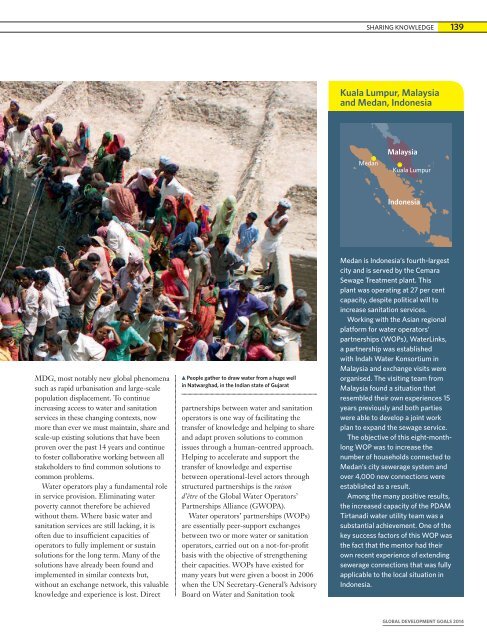FAMBB
FAMBB
FAMBB
Create successful ePaper yourself
Turn your PDF publications into a flip-book with our unique Google optimized e-Paper software.
SHARING KNOWLEDGE139Kuala Lumpur, Malaysiaand Medan, IndonesiaMedanMalaysiaKuala LumpurIndonesiaMDG, most notably new global phenomenasuch as rapid urbanisation and large-scalepopulation displacement. To continueincreasing access to water and sanitationservices in these changing contexts, nowmore than ever we must maintain, share andscale-up existing solutions that have beenproven over the past 14 years and continueto foster collaborative working between allstakeholders to find common solutions tocommon problems.Water operators play a fundamental rolein service provision. Eliminating waterpoverty cannot therefore be achievedwithout them. Where basic water andsanitation services are still lacking, it isoften due to insufficient capacities ofoperators to fully implement or sustainsolutions for the long term. Many of thesolutions have already been found andimplemented in similar contexts but,without an exchange network, this valuableknowledge and experience is lost. DirectPeople gather to draw water from a huge wellin Natwarghad, in the Indian state of Gujaratpartnerships between water and sanitationoperators is one way of facilitating thetransfer of knowledge and helping to shareand adapt proven solutions to commonissues through a human-centred approach.Helping to accelerate and support thetransfer of knowledge and expertisebetween operational-level actors throughstructured partnerships is the raisond’être of the Global Water Operators’Partnerships Alliance (GWOPA).Water operators’ partnerships (WOPs)are essentially peer-support exchangesbetween two or more water or sanitationoperators, carried out on a not-for-profitbasis with the objective of strengtheningtheir capacities. WOPs have existed formany years but were given a boost in 2006when the UN Secretary-General’s AdvisoryBoard on Water and Sanitation tookMedan is Indonesia’s fourth-largestcity and is served by the CemaraSewage Treatment plant. Thisplant was operating at 27 per centcapacity, despite political will toincrease sanitation services.Working with the Asian regionalplatform for water operators’partnerships (WOPs), WaterLinks,a partnership was establishedwith Indah Water Konsortium inMalaysia and exchange visits wereorganised. The visiting team fromMalaysia found a situation thatresembled their own experiences 15years previously and both partieswere able to develop a joint workplan to expand the sewage service.The objective of this eight-monthlongWOP was to increase thenumber of households connected toMedan’s city sewerage system andover 4,000 new connections wereestablished as a result.Among the many positive results,the increased capacity of the PDAMTirtanadi water utility team was asubstantial achievement. One of thekey success factors of this WOP wasthe fact that the mentor had theirown recent experience of extendingsewerage connections that was fullyapplicable to the local situation inIndonesia.GLOBAL DEVELOPMENT GOALS 2014


